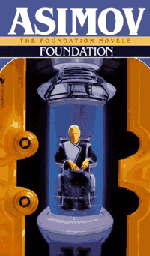  | ||||
HOME |
Seldon's Wisdom [Written in July 2003 for the July/August issue of The Voyageur. Copyright © 2003 Peter de Jager.]
Is it possible, will it ever be possible, to predict how people will react to a specific event to any useful degree of accuracy? Are there rules, perhaps yet to be discovered and formalized, to human behaviour? Is it possible to use an understanding of those rules to shape the future? Could our tomorrows become manufactured products of calculated action? I first read Foundation during my second-last year of high school. I was, by any reasonable definition, a "geek" ... not quite of the pocket-protector crowd, but I owned a slide rule and knew how to use it. My buddies at the time were also addicted to SF, and we spent many hours arguing over the possibilities presented by the science of Psychohistory. We were then presented with an opportunity to use our high school as a grand experiment. Like most high schools we had a student council, elected by the students and responsible for school activities such as parties, fund-raising, proms and concerts. We also, like many other schools, had a raging case of student-body apathy. Nobody attended school functions, sports events or concerts. School spirit was nonexistent. We, a cadre of invisible students, devoid of popularity, suffering from a dearth of cool, decided to fix this problem. While the formal tools of Asimov's Psychohistory were beyond our reach, there were some basic rules of human behaviour we could use in our social re-engineering project. The rule which best fit our situation was the concept of the swinging pendulum: popular opinion/behaviour swings from one extreme to the other. The trick is to identify the extremes and then apply enough force to nudge the system into one of these states. We ran for student council on the platform that student councils were a tool of the administration to distract our attention from the real problems of poor education, overcrowding, etc. If WE were elected we would abdicate our responsibility, shut down the council, do nothing for the following year, and ban all future student councils. Anarchy would rule! The administration hated us ... therefore the students loved us. We won by a landslide. We abandoned the student council. Phase I of our project was complete. Now we waited. Winning this election was an accomplishment of sorts. We had no prior status or influence within the student body, yet we beat much more popular and influential jocks, cheerleaders and divas. Rule #1? It's easy to get elected if that is your ONLY goal ... just promise the people whatever they want. Some of our politicians are very good at this. Throughout our elected year, we threw not a single party, flew no banners, raised no funds. For the first two to three months, everything was fine. Then, slowly but surely, discontent festered. The value of a student council grew conspicuous by its absence. It grew in importance because it didn't exist. Phase II of our project was well on the way to completion. That was our final year before we scattered to our universities, but we kept en eye on our little experiment to see if it would develop as we expected. It did. At the end of our last year, the students demanded a student council election. We knew someone would step into the breach at the appropriate time. A full council was elected. The next year, our school experienced a huge increase in student involvement. Parties, event attendance and fund-raising reached historic highs. The pendulum had swung from abject apathy to total commitment. Phase III complete. Mission accomplished. Apathy defeated. Hari Seldon would have been proud. Was there an unintended consequence to our little experiment? Fact: The individual who became student-council president ... went on to become a member of Parliament in Ottawa. Send feedback to Peter de Jager.
| |||
Interviews, Speeches, Articles | Voyageur Home Voyageur Fanzine Editor Upcoming Events & Conventions | Club History Main Site Editor & Site Problems IDIC Home Copyright © 2003, Infinite
Diversity International Corporation. |
||||

 Asimov's classic novel Foundation is the purest form of SF. It takes a fundamental desire-our need to predict the future-and then presents a "what if?" scenario and pushes it to the boundaries of our belief. Whenever I've read Foundation I've always spent more time wrestling with the central idea than actually enjoying the story line.
Asimov's classic novel Foundation is the purest form of SF. It takes a fundamental desire-our need to predict the future-and then presents a "what if?" scenario and pushes it to the boundaries of our belief. Whenever I've read Foundation I've always spent more time wrestling with the central idea than actually enjoying the story line.